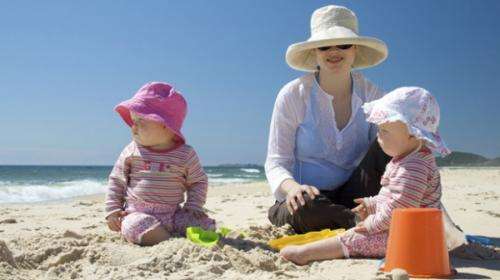More that a third of Brits have been sunburnt in the UK in past year

(Medical Xpress)—Despite nine in ten (92%) Brits knowing that too much exposure to UV radiation can increase their risk of skin cancer, new figures from Cancer Research UK and NIVEA SUN show that more than a third (35%) of Brits have been sunburnt on home turf in the past year.
This figure rises among younger adults with almost half (48%) of 25-34 year olds having been sunburnt in the UK in the last year and around a quarter (24%) less than a month ago– at a time when UK temperatures beat those in the Mediterranean.
The YouGov research also found that half (49%) of all Brits who have ever been sunburnt have at some point been sunburnt in the UK while at the beach. However, the survey revealed that you don't need to be sunbathing to get sunburnt in the UK; 36% of respondents have been sunburnt while gardening, 24% at a restaurant, pub or cafe, 20% at a BBQ and 15% picnicking in the park.
The research, which asked more than 5,200 people about their behaviour in the sun, was commissioned by Cancer Research UK and NIVEA SUN as part of their campaign to encourage people to protect their skin by spending time in the shade, covering up and using at least SPF 15 sunscreen.
The findings show that although some Brits are taking this advice on board many are still risking getting sunburn. Only 34% of Brits who go out in strong sun in the UK always spend time in the shade, and only 25% always reapply sunscreen of at least factor 15 regularly throughout the day, or cover up (25%). Of those who say they cover up, a t-shirt (60%), hat (58%) and sunglasses (72%) were the most commonly used items.
Sarah Williams, Cancer Research UK senior health information officer, said: "Now summer is here, we know it's tempting to go out and spend lots of time in the sun. But, as our research shows, it's easy to get sunburnt in the UK even if you're not deliberately sunbathing - so remember to look after your skin and enjoy the sun safely. We all need some sun to make vitamin D for healthy bones, but overexposure to the sun's rays can cause sunburn, which is a clear sign that the DNA in your skin cells has been damaged. Not only can this cause premature ageing and wrinkles, but it also increases the risk of skin cancer.
"That's why we've teamed up with NIVEA SUN to encourage people to enjoy the sun safely this summer. Whether you're home or abroad, when the sun is strong, spend time in the shade, pop on a t-shirt and hat, and use at least SPF 15 sunscreen to protect yourself and your family."
Cancer Research UK and NIVEA SUN are working together again this year to encourage people to enjoy the sun safely with three top tips:
- Spend time in the shade if your shadow is shorter than you. If your shadow is shorter than you are, then the sun is strong. During the UK summer, the sun is at its strongest between 11am and 3pm
- Wear a hat, t-shirt and sunglasses when the sun is strong. Wide brimmed hats or foreign legion style caps are best
- Cancer Research UK recommends you use at least factor 15 sunscreen with a high star rating when the sun is strong. Apply sunscreen generously and reapply regularly to make sure you get the level of protection on the bottle.
The partnership launched in July 2012, and aims to raise millions of pounds for Cancer Research UK's vital skin cancer research over three years. As well as fundraising for the charity, NIVEA SUN will be working with Cancer Research UK to promote key sun safety messaging through an advertising campaign across radio, online and outdoor, coupled with an experiential campaign handing out sunscreen at beaches, parks and events.





















